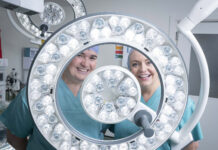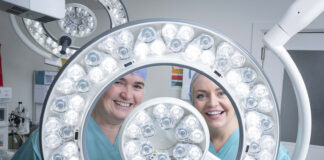Most of us will be familiar with that feeling right after Christmas dinner, and you slouch on the couch, and you just feel like sleeping. It might be just the afternoon, but there is a science behind that nap.
The Gut Connection
Consultant Gastroenterologist Dr Deirdre O’Donovan said our energy levels are profoundly affected by our gut health.
“This can be through several mechanisms. We are all familiar with that desire to have a nap after Christmas dinner, and that is because a high-calorie meal requires an increase in blood flow to the gut as part of the digestive process with an associated drop in blood pressure systemically and particularly to our brains, hence that sleepy feeling.
“I think there is a growing awareness that what we eat/ the gut health has a direct bearing on our energy levels. I guess what I would be more worried about is people not spotting an underlying condition. If symptoms are not improving it may be a sign of a more significant process going on that needs medical input.”
The festive period tends to be a time for all the wrong foods, and while it’s nice to treat ourselves. GP Dr Phillip Kieran says that our guts simply don’t like sugary, fatty or processed foods and be more mindful of what we consume.
Underlying Conditions
Dr O’Donovan says that meal composition is critical, and we want to aim for a nice balance of macronutrients to allow an easier digestive process.
“In some cases, people will drop their blood pressure significantly after a carbohydrate-rich period. This applies particularly to people with diabetes and older patients who may feel tired after a meal or infants run the risk of fainting, and that’s caused by a problem of the autonomic nervous system. In many cases, conditions like coeliac disease when untreated causes fatigue because patients do not absorb necessary nutrients, especially iron from their diet.
“Other gut-related diseases which cause bleeding from the bowel can also result in anemia, and lack of energy may be the only sign to alert someone that something is wrong. For others, dysbiosis/alterations in the natural gut flora can contribute to what many refer to as ‘brain fog’ and profound lassitude, and this can be helped by introducing a good probiotic. Alflorex is one I generally recommend”.
When we do feel run down or tired, a lot is happening in our gut. Depending on the cause, feeling run down can reflect underlying anemia, i.e. low iron, or vitamin B12.
“In those cases, your gut ‘villi’ the finger-like projections that absorb iron may be faltered as in the case of coeliac disease, or there may be antibodies floating around in the blood preventing the absorption of B12 as in the case of Pernicious anemia. Interestingly, a large proportion of our immune system is based in our gut, and our resident gut flora likely interacts with this daily.
“This can potentially switch on and off specific immune responses. This is an area where a lot of research is happening, so we await the outcome of those investigations and whether is some way we might be able to profile in detail what’s happening to our gut flora during periods of stress in our lives and how our immune systems respond to this changes; more importantly how we might influence them positively,” said Dr O’Donovan.
Make Simple Changes and Watch out for Stress
Dr O’Donovan said people often ask if there is anything they can do to help, but at the start, it’s simple supportive management. She does recommend getting a good night’s sleep, reducing alcohol and caffeine.
She said getting regular Exercise and eating a balanced diet also helps. Dr O’Donovan also said people should consider taking a probiotic like Alflorex.
Maybe 2022 should be less about the “To Do” lists and more about the “To Be” Lists? That sleep issue and your ability to fall asleep could be underpinned by the ruminating regrets of all the things you didn’t tick off the former list.
Dr O’Donovan continues: “It’s been a tough year for everyone. Be aware of how stress affects you as an individual – we are not designed to cope with stress 24/7. Practice ‘self-care’ whether it’s learning to say no/ mindfulness/meditation/complementary therapies such as acupuncture as they can all play a role.
“Also, there’s always the debate of ‘nature vs nurture’, but we can’t blame genetics for everything. We see certain conditions affecting the bowel like inflammatory bowel disease where genetics is important, but often the timing of the disease presenting itself is influenced by a stressful period in one’s life, affecting immune responses.
“It sounds corny, but we all need to listen to our bodies. Try and respect them, take the simple steps outlined here, and if symptoms persist or if it’s not improving it may be a sign of a more significant process going on that needs medical input, and you need to contact your GP.”
Dr. Phillip Kiernan advises people to Drink Water, Reduce Alcohol and keep up the Exercise.
“Water is the healthiest thing to drink and is particularly important for gut health. It’s easy to drink too much alcohol over Christmas, which can harm the lining of the gut and the balance of bacteria. Staying well hydrated with water can reduce some of this negative effect.
“Although we might enjoy having a few beers or a few glasses of wine to relax, our guts too often pay the price. Flatulence, bloating, and belching are all common effects of booze on the gut. One of the best things you can do is to instead hydrate with water. Exercise is that magic medicine that positively affects every aspect of our health, and our gut is no exception.
“In fact, there is evidence that exercise changes the bacteria in our guts for the better. It also helps prevent constipation and moves along with unwanted gas which can be an issue around Christmas time.”
His advice is to reduce junk food and try a probiotic.
“Try to avoid junk foods like soft drinks, biscuits, and chips. Also, make sure to get some fibre in the diet, this is so hard to do when we are surrounded with our usual Christmas fare. Instead, try to plan ahead and keep healthy snacks at hand.
“When you’re leading a busy life and find that your bowel is becoming irritable, I’d also recommend taking Alflorex. It’s a probiotic with a unique 35624 culture that clinical trials have shown to improve symptoms of IBS,” he said.














